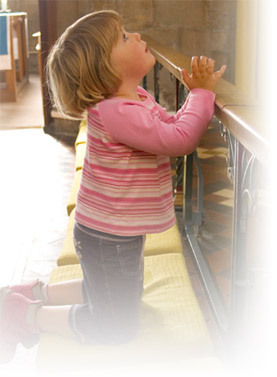Sunday Sermon for June 24, 2012, the Solemnity of the Birth of St. John the Baptist
Readings: Is 49:1-6; Acts 13:22-26; Lk 1:57-66, 80
Today we have the privilege of celebrating what might be called a Sabbath Year Feast, that is, a feast that we celebrate on a Sunday only once every seven years. The Birth of John the Baptist is one of only three births the Church celebrates in the course of the liturgical year along with our Lord and our Lady. These are the three who were born without Original Sin. St. John was conceived with Original Sin, but at the Visitation, when he leapt for joy in his mother’s womb, Original sin was removed from his soul (as it is with us at our baptism). So, he had the effects of Original Sin, but was born without this stain on his soul.
Other than a few exceptions, Sundays always take precedence over a feast day. Those exceptions are feasts that have something to do with our salvation. Since St. John the Baptist had nothing to do with saving us, why would the Church allow his birth to be of higher significance than the regular Sunday? It is because of the role God had given to the Baptist.
St. John the Baptist is the last of the Old Testament prophets and the first of the New Testament prophets. His birth shows in a dramatic way what his life and vocation are all about. He is born without sin and he announces a baptism for the forgiveness of sins. He calls himself the voice; at the moment he is to receive his name (at his circumcision) his father’s tongue is loosed and his voice is heard for the first time since before the child was conceived. The neighbors all recognized the miracles surrounding this child and wondered what he was going to be.
The angel gave the name of the child to Zechariah when he appeared to him. John, Yohannan in Hebrew, means God is gracious. He came as the forerunner of the Messiah to pronounce the grace of God that would be ours in Christ. In fact, the little statement he makes about not being worthy to unfasten the sandals on our Lord’s feet is an important one in Israel.
John proclaimed clearly that he was not the Messiah, but what, then, is his role? The reference to the unfastening of the sandals is about the best man in a wedding. Jesus is the Bridegroom of our souls, and John the Baptist is His best man, although he thinks himself unworthy of such a position.
As it was with our Lord, so it was with St. John the Baptist: on the natural level one would think that his life was a waste. Spending years near the Dead Sea, eating grasshoppers and wild honey, wearing camel skins for clothes, and finally being beheaded for his witness to the truth. Sure he preached to a handful of people and baptized quite a few. But in all, his life seems fairly insignificant.
More than anything, this apparent insignificance speaks volumes about the humility of this man. He was chosen by God from the womb and given extraordinary graces to live an austere life and deal with years of rejection from people who probably wrote him off as strange. Never once do we hear about a miracle this man performed, yet our Lord said that there is no man born of woman greater than John the Baptist.
Truly God hid him in His quiver but, like a polished arrow, he was exceedingly smooth and effective when the time came for God to use the arrow for its intended purpose. In the spirit of the great Elijah, John the Baptist does not fail in responding generously to the call of God and in providing inspiration for the people.
Even today, over 2000 years later, his voice continues to be heard and he continues to inspire us to follow the will of God, even when others do not understand. While none of us marks the point of delineation between the two Covenants, nonetheless, each of us is called by God for some purpose. The people wondered what this child was to be. What about you? We often give people reason to wonder, but it is not usually about what God might be asking of us. We are like Zechariah who doubted, but eventually cooperated with God.
No matter what our state in life, we have wonderful examples placed before us today. God has called you to holiness and, if you are parents, he has also called you to form your children (and grandchildren) into Saints. This is done in a variety of ways, but most importantly, through example. Even if no one wondered and questioned because the events surrounding your birth were fairly normal, you still have to ask God: What do you want of me?
Fr. Altier’s column appears regularly in The Wanderer, a national Catholic weekly published in St. Paul, Minn. For information about subscribing to The Wanderer, please visit www.thewandererpress.com.

